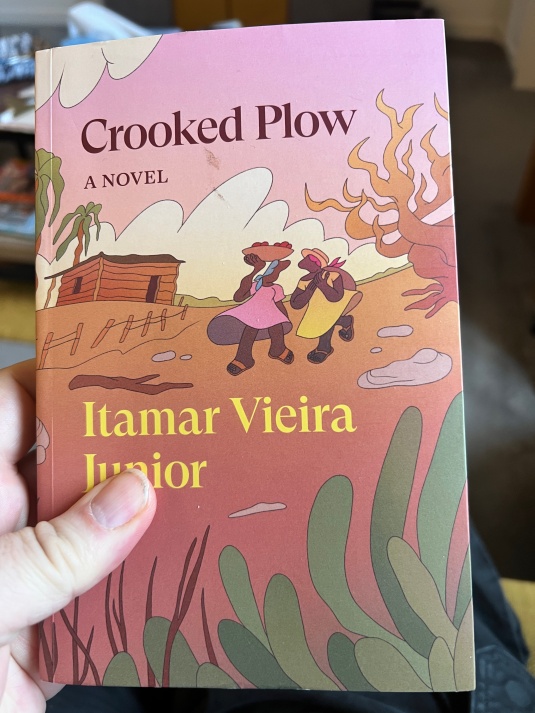Crooked Plow by Itamar Vieira Junior
Brazilian fiction
Original title – Torto Arado
Translator – Johnny Lorenz
Source – Personal copy
One does wonder with this year’s longlist as I am now writing this post with about 300 pages left of the last book. I wonder which of the titles from this year’s longlist I would have picked up without them being on the longlist. I looked at the books when they came out of them all. There were a few I had probably intended to get, the Wiener and the Kadare, as I had read books from them before and enjoyed them. This fell into a category called Published. In recent years, we have published exciting books, which has been the case with Verso. They always pick left-field books, which is a little joke, given I know they are a left-wing publisher. But their recent fiction choices always seem great, so this from the Brazilian writer Itamar Vieira Junior had been on my radar. He studied geography, getting a scholarship for people from poor Black backgrounds in Brazil. He got a doctorate in African and Ethnic studies. He works for the Brazilian state agency dealing with land reform. This was his debut novel. Before that, he had two collections of short stories.
Belonísia pulled the blade from her mouth, too, then brought her other hand up, as if trying to hold something in.Her lips reddened, and I wasn’t sure if it was from the excitement of tasting the silver blade or from wounding herself, for she was also bleeding. I swallowed as much blood as I could. My sister was wiping her mouth frantically with her hand, her eyes squinting with tears as she tried to stand the pain. I heard my grandmother’s slow steps approach, then she called out to me, to Zezé, Domingas, and Belonísia.”Bibiana, can’t you see the potatoes are burning?” I became aware of a smell of burnt potatoes mingling with the smell of metal and the blood wetting our dresses.
As the twins cut there tongues in the opening pages .
Now set in the hinterlands of Brazil, this book has one of the most exciting openings I have ever seen. Two sisters are at their Grandmother’s house, and they find a knife under a bed. Then, they decide to play and cut one another’s tongue. As a result of this, one of them ends up mute. The sisters Bibana and Belonsia are the book’s narrators, but it isn’t clear which lost their tongue and is mute for most of the book. Their father is a renowned healer as we follow them through their lives. In a way, it is clear as one sister excels at school and the other struggles with her studies The book sometimes is a little magic realist in places, but in others, you can see this is from the work the writer has done himself with land reform, and this is shown later in the books as the sisters start to see how their world is that being an Indian in the hinterlands and this is shown as the modern threats that threaten this world in modern Brazil show there faces in last part of this book as this part feels very much about the corruption violence and struggles of many poor families in the hinterlands of Brazil.
Years after the accident that had left one of his daughters mute, my father, with Sutério’s encouragement, invited my mother’s brother to join us at Água Negra. Sutério, the manager, wanted to bring in folks who “would put their shoulder to the wheel,” who, as my father explained,”weren’t afraid of hard work and would pour their sweat into the fields.” They could build houses of mud, but not brick, nothing enduring to mark how long a family had been on the land. They could cultivate a small plot of squashes, beans, and okra, but nothing that would distract them fromthe owner’s crops because, after all, working for him was what enabled them to live on this land.
It is kept quiet which sister is the mute for peroid of the book!
I can see why this is such a hit in Brazil, but in a way, that is what serves against it so much asi felt the writer has crammed so much into this book in a way it felt like three books the start book the middle part and the end part would all be served better filled out and made into longer parts novels in themselves.. I said I love Verso books, and this is why Vieira Juniors is one of a new wave of Brazilian writers tackling the dark racist past and slave history, land corruption, etc, in Brazil’s past. We must hear his voice. He is also an heir to Jorge Amado, who wrote about the hinterlands in his early writing life, but this is a fresh take from an Afro-Brazilian writer. For me, this had part of writers like Wilson Harris, who did so well capturing the remote parts of his homeland, or Marquez with His Columbia oif the time. It has a small dash of magic realism. But also a large dash of the past and how that affects modern Brazil. In that regard, he reminds me of someone like Juan Gabriel Vasquez, who, in historical books, tackles the past as a prism to the present. Have you read this book? or have another favourite book from Brazil, if not there are 18 other books under review on the blog!
Winstons score


Apr 07, 2024 @ 18:35:21
This has been the one book on the longlist which I probably wouldn’t have read and I’m glad I have read.
Apr 07, 2024 @ 23:59:20
It certainly has a most imaginative beginning!